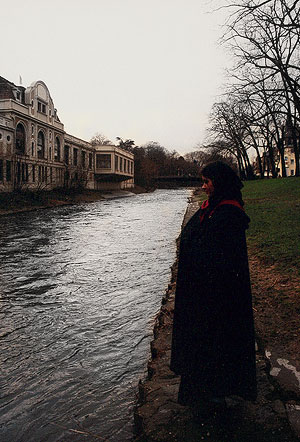
The flashbacks began the day after Christmas. We were packing up our lives again, moving on from our "temporary" home of the last three months. We bought boxes to replace those which had not survived the first move and returned the furniture in our apartment to its original configuration, since it had inevitably moved around in the time we had spent in Bad Neuenahr. After weeks of wondering when we would be moving back down the Rhein to Bad Breisig, of living constantly aware that today could be the day with the phone call and the instructions to change residences, it was finally happening.
Before we could leave, though, we had to say goodbye to Bad Neuenahr, our small spa town with its resorts and retirees, our home since October. We took a last walk along the Ahr, gray and turbulent with winter water, the bank grasses caked in sheets of ice abandoned by the receding high water. At the bridge to the spielbank, we visited the remaining stubborn ducks, still bottoming-up for their dinner despite the rain and the ice and their just barely frozen feet. We visited our favorite Italian restaurant, where we always had the same waiter and where the owner, Gianni, would sometimes stop at our table for a brief tri-lingual conversation. When we told them we were moving, they wished us well and invited us back sometime, since everyone must eat. Gianni presented us with a bottle of wine, pointing out its Sicilian origins. "Vino mafioso!" he declared, tapping the bottle's label.
On the day we moved, we loaded and unloaded our rented station wagon four times, shuffling suitcases, boxes, computers, and groceries down the Rhein to Bad Breisig. On our final trip out of Bad Neuenahr, we stopped to say goodbye to Killybegs, the Irish pub which had nearly become a remote living room. The group of us had been regular visitors, gathering at a corner table, drinking Irish coffees, gleefully abandoning our broken German in conversations with the Irish bartenders. Occasionally, we had even encountered the Killybegs staff at other establishments, where we bought each other rounds of Jägermeister and vodka Red Bull cocktails. Free advice: don't try to out-drink Irish bartenders. We didn't learn this until after people had been dropped on their heads and the rest of us lay laughing in the deserted early morning streets.
|
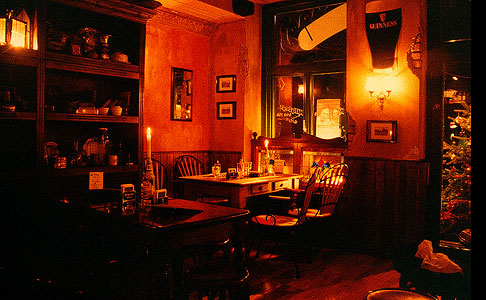
Madcap adventures and drunken antics aside, Killybegs had started to feel like an extension of home. I still get cravings for something called "cream of homemade soup" and pints of hard cider flavored with a shot of cassis syrup. Add fresh soda bread and a pile of very hot fried potato wedges with blue cheese dressing and mayonnaise (yes, mayonnaise), and it's a beautiful cold weather meal, designed to make you all warm and cozy on the inside, even if your fingers are still freezing. Ian and I ate our soup in a mostly empty bar, a small reminder that everyone else in our group excepting ourselves and Athena had returned to the States for the holidays. We would be the first to move in to our new home, a place we had been talking about and planning for since September, before we had moved to Germany.
|
|
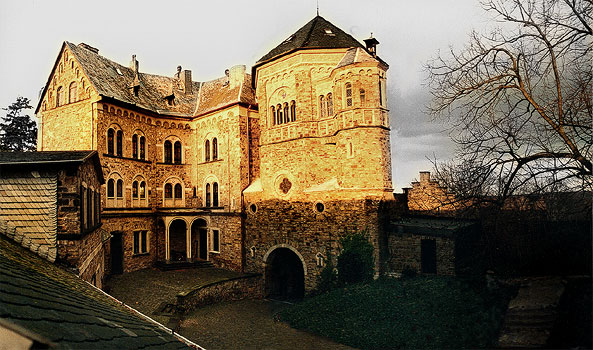
Burg Rheineck stands on a hilltop just upriver (that's south) from Bad Breisig, overlooking a bend in the north-flowing Rhein. Standing in the right parts of town, you can see the roof silhouetted against the winter sky, peeking through the winter-bare trees. Standing at the top of Rheineck's tower, you can see all of Bad Breisig, the road to Waldorf, the barges rounding the corner at Brohl on their way from Koblenz, and highway B-9 stretching north to Bonn and Köln.
This hilltop tower, or at least a predecessor, marked a boundary of the Roman Empire for this stretch of the river. When the Romans retreated with their collapsing empire, they left the watchtower behind. The first castle built on this hill was a medieval one, destroyed at least twice before 1300. As the Rhein developed into a major trade route, Rheineck was the perch of "robber-barons," a nobility of thieves who watched for passing ships then stopped and taxed each one for the privilege of negotiating the bend in the river. Each defensible portion of the Rhein bears a castle or some remaining bit of castle, a silent testimony to the wealth borne on the river and to the success of those who wrenched their wealth from others.
Of this period, for Rheineck, only the tower and a chapel remain. The bulk of the building bears the date 1832 above a north-facing window on the fourth floor. In its more recent history, the castle was a museum and restaurant/hotel that once hosted Gorbechev before it was purchased by a developer as an inheritance for his daughter. He never quite got around to making it into the residence he meant to; the front gate bore her monogram, but the interior doors still wore their hotel room numbers, and the hotel stemware still lingered in the closets.
|
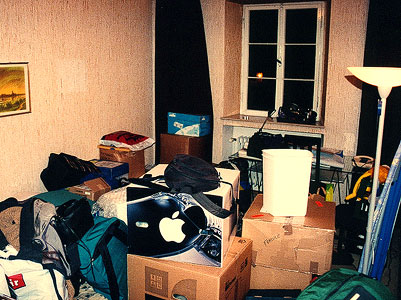
Our plan for the place would require some rather extensive renovations. It needed mundane details like a functioning kitchen and technological necessities like individual phone lines, networking and satellite dishes. The interior decor needed to be brought into the Nineties, quickly, before it got stuck with a nightmare of the Seventies at the birth of a new Millennium. There would be offices and living quarters and guest rooms and a meeting/demo space. So we would live in a construction zone; at least Rheineck belonged to this group.
Ian and I unloaded the car into our new quarters, a temporary place to live while the jury was still deliberating on the purposes of all the rooms in the main building, and while the central staircase was in the middle of a face lift. Our new room was no bigger then any of the dorm rooms I lived in at college, but we got our own bathroom, "large enough for playing fußball." Located near the end of the hall that ran above the garage (added 1971), our bedroom lacked the quaintly sloped ceiling of the rest of the rooms, a feature which had Athena threatening to wear her motorcycling helmet while working. Since these rooms were slated either for removal or thorough remodeling, we were free to decorate as we pleased. This was our space, our home. I hung our Christmas lights over the bed, hid the wine and secret stash of Skittles in the windowsill, and spread our homemade quilt over the bed. Ian hung movie schedules on the wall and strung cables connecting the computers and the phone. We planned a trip to Koblenz to buy a bookcase.
New Year's Eve 1999 found us standing atop our medieval tower at midnight, the wind pulling at our clothes as we stood in the freezing night, watching the fireworks up and down the river. Anyone can buy fireworks in Germany for New Year's, and practically everybody did. From our tower perch, we could see the celebrations from Koblenz in the south to Bonn and Köln in the north; we saw the red scars in the sky from towns we didn't even know were hiding behind the hills. The castle across the Rhein, a restaurant, put on a huge display, which was answered by the show from a barge parked along Bad Breisig's riverfront. We were high enough on that windy lookout to be on even footing with the large fireworks and to look down on the tiny red flares that burst from each backyard. The Millennium arrived to a Rhein valley in flames.
We celebrated Not-the-End-of-the-World in true German style, drinking whatever was handy in the subterranean pub in Rheineck's basement. Mario, hired by the company to be caretaker and handyman and butler, brought his dj equipment to the pub, and we washed Bad Briesig in the sounds of Metallica and ABBA until the small hours of the morning were not quite so small. Ian's new cell phone got a crash-course introduction to the New Year as well; we maxed out the calling card informing everyone in the States (everyone we had phone numbers for, that is) that we had tested out the New Millennium and that it was safe for US consumption. Oh, and that we were living in a castle.
|
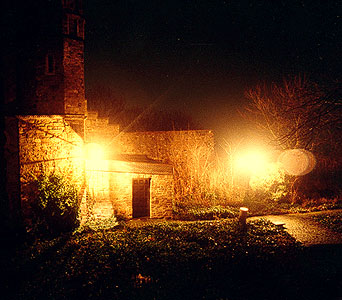
|

